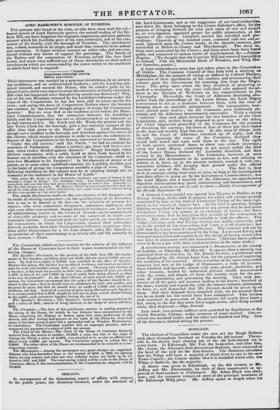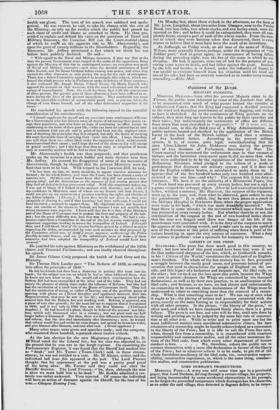SCOTLAND.
The election of Councillors under the new act for Burgh Reform took place throughout Scotland on Tuesday the 5th instant. There- suit is, the almost total clearing out of the old Self-elected set in every town. In Edinburgh, Mr. Tait the bookseller, and after him, Mr. Ayton, the Advocate, both determined Radicals, were retuined at the bead of the poll for the first district. The Scotsman calculates that the Whigs will form a majority of about three to one in the new Town-Council ; the Courier thinks that it is doubtful which side, the
Whigs or Radicals, has the majority, . -
A dinner was given in Edinburgh, on the 6th instant, to Mr. Jeffrey and Mr. Abercromby, by such of their constituents as ap- MELAND. proved of their conduct in Parliament. Mr. Adam Black was chair- threatening aspect of affairs with respect man ; and the company comprised most of the principal members of Attorney- General, under the sanction of the Edinburgh Whig party. Mr. Jeffrey spoke at length when his
health was given. The tone of his speech was subdued and apolo- • getical. He was content, he said, to take his chance with the rest of •• the Ministry—to rely on the verdict which the public had passed for. • Such share of credit and blame as attached to them. He then pro- ceeded to explain and defend his votes on the questions of Naval and Military Sinecures, the Coercion Bill (on the Court-martial clause of which he votAl on the opposite side to Mr. ..Abercromby), and upon the grant of twenty millions to the Slaveholders. Regarding the Sinecures, Mr. Jeffrey mentioned a fact which we think has not before been publicly declared. He said-
" With regard to the Naval and Military sinecures, I may say that at the time the present Government were ranged in the ranks of the opposition, firing against the'illinistry of that day in unmitigated terms—an exception was made of Naval and Military sinecures—such were the decided sentiments of Lord John Russell, and Sir Janice Graham i before coming into power, and when they viewed the other sinecures as only paving the way for the ends of corruption. There was a Select Committee appointed to investigate this subject, which ems braced the whole persons who in Parliament spoke iii defence of those sinecures; it also embraced Mr. Joseph Hume, Colonel Evans, Sir Henry Parnell, who opposed the measure on that occasion, with the usual vehemence and the usual energy of impeachment. Now, the result has been, that with the concurrence of those persons, the greater part of those allowances have been suffered to re- main during the lives of the present incumbents. That conclusion was come to on the irresistible evidence of accumulatfd proof, and, as you see, led to the change of even Hume himself, and all the other determined supporters of his views."
He coneluded his speech with the following appeal to the merciful consideration of his constituents-
' " I should supplicate for myself and my associates some continuance of favour for a Goverument who has thrown away all means of advancing their power ex- cept their popularity, and who have no hope of continuing in otilce except by conforming to the tenor of their past life,—who can have no interest but an inte- rest in common with you all, and in point of fact have not the slightest inten- tion of deserting the principles they first adopted, but only the desire of studying the more favourable time of carrying their views into effect. I hope therefore, you will cheer them on,—cheer them under the suspicions which unfortunately sometimes cloud their career ; and I hope the end of the showery day will emerge in genial sunshine ; and I also hope that then no stain or suspicion of merce- nary or unworthy motives will be laid to their charge."
Mr. Abercromby's health was then proposed ; and that gentleman spoke on the occasion in a much bolder and more decisive tone than Mr. Jeffrey. He avowed his disapproval of some of the measures of Government, though he thought that the present Ministers were the best that were to be had. With respect to the Coercion Bill, he said,
"It has liven my fate, on many occasions, to oppose coercive measures for Ireland ; for her whole history, ever since the Union, has been alrnoSt a series of coercive acts. Of these acts I never knew that they did not produce a tem- porary relief; but the discussions on the measure of Last session proved that they had all foiled to bring permanent relief. With this experience before me, was not to blame if I looked at the measure with distrust ; and if, with all my confidence in Ministers, some of whom are my clearest and best friends, I could not give up my opinions on a question touching the rights and liberties of any fellow-subjects. ( Cheers.) I knew they would not abuse it—they were incapable of abusing it ; and if that knowlege had been sufficieut, I would not have hesitated a moment to support them. fr.ly objections were, not because I was not sensible of the abuses in Ireland, not because I was not sensible that strong measures were requisite. I knew well that the first duty of the Ministers and of the House of Commons was to protect the lives and property of the sub- ject; but the great difficulty was, how that was to be done. We had a volu- minous report from a Committee at the end of the last session, containing very important suggestions tending to secure the tranquillity of Ireland. thought then, and I still think, that if the session had been opened by a liberal measure respecting the tithes, accompanied by some suck measure as that proposed by the Committee, which was of itselfa severe measure, authorizing the Police forcibly to enter houses, and see if the inhabitants were at home—if these measures lead been adopted the tranquillity of Ireland would have been secured."
He justified his vote against Ministers on the withdrawal of the 147th clause, and Triennial Parliaments; and was loudly cheered throughout his speech.
Sir James Gibson Craig proposed the health of Earl Grey and the Ministry.
Sir Thomas Dick Lauder gave "The Reform of 1832, as carrying into effect the principles of 1688."
He felt his friends had done him a disservice in putting this toast into his hands ; for the subject was one on which he had so often addressed them, that he knew not now what to say. He would call to their consideration how the Reform Bill had been exemplified at the other end of the table. They had not merely the pleasure of sitting there under the influence of Reform, but they had had the satisfinition of a small taste of the house of Commons itself. They had had the satisfaction of seeing, or rather oflearinss one of the prettiest pieces of eparring with gloves on ( Great laughter and applause) between their two Representatives, that ever he saw in his life ; and these sparring about trifles assured him that the Reform Act was working well. Reform, it appeared ,was a plant of very slow growth ; for the toast led one to suppose that it was planted in 1689, and it was only in 1832 they saw the first blossom. (Continual laughter.) He had heard of a plant, though he believed the account was fabu- lous, which only blossomed once in a century ; but our plant took one half longer before it blossomed. But then, there was this differeoce between the aloe and reform, that the aloe died immediately after blossoming ; now, he trusted that reform would live and strike its roots deeper, aud spread its branches wider, and give blossom after blossom, and Toot after root. ( Great applause.)
Many other toasts were given and speeches made; and the company, who mustered three hundred, separated about twelve o'clock.
At the late election for the new Magistracy of Glasgow, Mr. D. .14tNicol voted for the Liberal list ; but his vote was objected to, on the ground that he was not in the burgh register. On examining the Parliamentary Register, it was found that the Sheriff had marked him as " dead ;" and Mr. Turner (Town-Clerk) said, in these circum- stances, he was not entitled to a vote. Mr. M'Alister, writer, said the individual bad bona fide appeared at the poll. The Lord Provost thought that his appearance at the poll was a pretty good proof of his being alive. Mr. Turner said they could not alter the Sheriffs' decision. The Lord Provost—" So, then, although the man is alive we must hold him to be dead." Mr. Reddie admitted it cer- tainly was rather awkward. Vote rejected. Of course the individual will have an action of damages against the Sheriff, for the loss of his vote.—Glasgow Evening Post. On Monday last, about three o'clock in the afternoon, on the farm of Mr. Lyon, Langshoti about two miles from Glasgawrnear to the Paisley Road, two hay-ricks, two wheat-stacks, and one barley-stack, were dis. covered on fire ; and before it could be extinguished, they were all corn. pletely burnt, except a part of each of the wheat-stacks. From the man. ner in which they were burning when first discovered, there is every reason to believe that it must have been the work of an incendiary.
At Jedburgh, on Friday week, an old man of the name of William Wilson, more generally known, perhaps, under the designation of "the Jeddart poet," died in great agony, an consequence of having fallen, during the preceding night, into the fire of the room in which he was sleeping. He had, it appears, risen out of bed for the purpose of pro- curing some water to drink, and had fallen against the grate. Stunned by the fall, and besides, it is feared, under the influence of liquor, he was unable to extricate himself from his situation until his head and one of Isis sides had been so severely scorched as to render every remedy unavaili rig. —Kelso Mail.



















 Previous page
Previous page